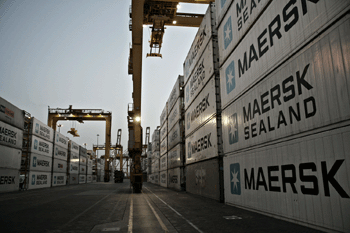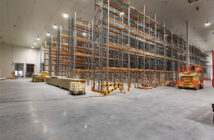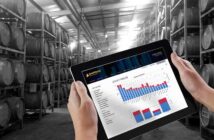New software being installed in Maersk Line’s entire refrigerated (reefer) container fleet will cut CO2 emissions by up to 65 percent, compared to a traditional reefer container. That will drop the company’s fleet’s emissions by 500,000 tons every year.
Maersk Line’s New Zealand trade and marketing manager, David Gulik, says the innovation would revolutionise the way reefer containers are kept cool.
Traditional container cooling systems focus on the air temperature in the container. They keep up a constant air flow and temperature at all times. This means air, heating and cooling are often run at excessive levels, resulting in unnecessary energy consumption, carbon emissions and costs.
The new technology focuses, instead, on maintaining the exact desired cargo temperature. It constantly adjusts air, heating and cooling to optimum levels.
Consequently, it uses much less energy, less CO2 emissions and lower operating costs.
Mr Gulik says that while container shipping is by far the most environmentally efficient way to transport goods over long distances, this innovation was a game changer for the entire transportation chain.
“It’s a boon for the lines, but truck and train companies and terminal operators will also see their power bills and CO2 emissions go down.”
Dubbed QUESTII (Quality and Energy efficiency in Storage and Transport), the new software is the result of a three-year development project sponsored by the Dutch government.
It was driven by Wageningen University and Research Centre in the Netherlands and Maersk Line has been involved from the beginning.
The system’s efficiency, and the impact it has on maintaining product quality during shipping, was tested first in laboratories and then on hundreds of live trial shipments. Maersk customers have been involved as development partners on a broad range of chilled products.
The results have been very successful.
Leading New Zealand meat exporter, Alliance Group, has done several trial shipments using Maersk Line’s QUESTII containers.
Development services manager Gary Maclennan is very happy with the result. He says the new technology fits well with the company’s focus to reduce their environmental impact from “farm to fork”.
“QUESTII should deliver an improved cold chain for our high value chilled products, whilst also significantly reducing energy usage during shipping. This will have a positive impact on the CO2 footprint of Alliance products into our many markets around the world,” he says.
Mr Gulik adds that eco-efficiency and environmental sustainability are important to many of Maersk’s customers, and are central to Maersk’s own business strategy.
“We aim to make containerised transportation even more environmentally friendly and cost efficient. That’s the reason why we are involved in development projects, such as QUESTII, to protect the environment,” he says.





























































































